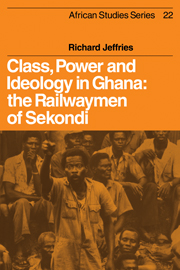Book contents
- Frontmatter
- Contents
- List of maps and tables
- Acknowledgements
- Introduction
- Part I A political history of Ghanaian railway unionism
- 1 The railway and harbour workers of Sekondi-Takoradi: a sociological profile
- 2 The origins and dynamics of Railway Union development
- 3 The railway workers in the nationalist movement – the meaning of political commitment
- 4 The politics of TUC reorganisation under the CPP regime
- 5 The railway workers' response to CPP socialism: the strike of 1961
- 6 The development of an independent and democratic trade union movement
- 7 The railway workers divided: the sources and structure of political conflict in the Railway Union
- Part II Class, power and ideology
- Conclusion
- Appendix: Survey questionnaire administered to a sample of railway workers at Sekondi Location
- Notes
- Bibliography of sources cited
- Index
5 - The railway workers' response to CPP socialism: the strike of 1961
Published online by Cambridge University Press: 30 September 2009
- Frontmatter
- Contents
- List of maps and tables
- Acknowledgements
- Introduction
- Part I A political history of Ghanaian railway unionism
- 1 The railway and harbour workers of Sekondi-Takoradi: a sociological profile
- 2 The origins and dynamics of Railway Union development
- 3 The railway workers in the nationalist movement – the meaning of political commitment
- 4 The politics of TUC reorganisation under the CPP regime
- 5 The railway workers' response to CPP socialism: the strike of 1961
- 6 The development of an independent and democratic trade union movement
- 7 The railway workers divided: the sources and structure of political conflict in the Railway Union
- Part II Class, power and ideology
- Conclusion
- Appendix: Survey questionnaire administered to a sample of railway workers at Sekondi Location
- Notes
- Bibliography of sources cited
- Index
Summary
In the ‘Positive Action’ strike of January 1950 the Sekondi-Takoradi railway and harbour workers had demonstrated their enthusiastic support for Nkrumah's nationalist campaign. In September 1961 they staged a seventeen-day strike against the Nkrumah Government's July budget, a strike in which, according to St Clair Drake (who was present at the time), ‘the Government saw its very existence implicitly challenged’, and which ‘drastically altered the entire character of political activity in Ghana’. This latter strike action, while certainly motivated in part by economic grievances – most obviously, opposition to the budget proposals for a property tax and a compulsory savings scheme – was also undoubtedly informed by wider political motivations. The staging of an illegal strike in so determined a manner, in opposition moreover to measures which the government had made clear it considered essential to the achievement of its major objectives, and in what was politically an extremely sensitive moment – with Nkrumah out of the country visiting the Eastern Communist bloc, and widespread popular unrest in Ghana at the budget's austerity measures – suggests that, at the very least, the 1961 strike expressed a far-reaching disillusionment with the Nkrumah regime.
This opposition, it should be remembered, came from the former vanguard supporters of Nkrumah. If political allegiance in the Ghanaian nationalist movement entailed more than a purely immediate economic alliance, then the reasons for the railway workers' disillusionment merit extensive consideration.
- Type
- Chapter
- Information
- Class, Power and Ideology in GhanaThe Railwaymen of Sekondi, pp. 71 - 101Publisher: Cambridge University PressPrint publication year: 1978



